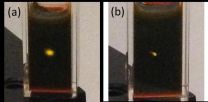(Press-News.org) OAK BROOK, Ill. - Specific cardiovascular risk factors, such as alcohol consumption, smoking, obesity and diabetes, are associated with smaller regional brain volumes that may be early indicators of Alzheimer's disease and dementia according to a study published online in the journal Radiology.
"We already know that vascular risk factors damage the brain and can result in cognitive impairment," said Kevin S. King, M.D., assistant professor of radiology at the Keck School of Medicine of the University of Southern California in Los Angeles. "But our findings give us a more concrete idea about the relationship between specific vascular risk factors and brain health."
Prior studies have linked cardiovascular risk factors and cognitive decline, but the new study focused on specific risk factors and examined three main brain regions, including the hippocampus, precuneus and posterior cingulate cortex. Because of each region's connection to memory retrieval, gray matter volume loss in these areas may be a predictor of Alzheimer's disease and dementia.
In the new study, Dr. King and colleagues analyzed results from 1,629 individuals in the Dallas Heart Study (DHS) and divided the participants into two age groups. There were 805 participants under age 50, and 824 age 50 and older. The researchers evaluated the participants' data from the initial baseline visit, which included laboratory and clinical analysis, and the follow-up visit seven years later consisting of a brain MRI and cognitive test, measuring mild cognitive impairment and preclinical Alzheimer's disease.
By comparing the initial visit in which cardiovascular risk factors were identified to the MRI results and cognitive scores, the team was able to distinguish the specific risk factors of alcohol consumption, smoking, diabetes, and obesity and their relationship to smaller volumes in the three targeted regions of the brain. The results confirmed that lower cognitive test scores correlated with lower brain volumes in each area.
The study found that risk factors of alcohol use and diabetes were associated with smaller total brain volume, while smoking and obesity were linked with reduced volumes of the posterior cingulate cortex, the area of the brain connected with memory retrieval as well as emotional and social behavior. In addition, lower hippocampal mass was linked to both alcohol consumption and smoking whereas alcohol use, obesity and high fasting blood glucose numbers correlated with reduced precuneus size.
The findings also suggest that in patients age 50 and older, diminished hippocampal and precuneus volumes may be early risk indicators for cognitive decline, while smaller posterior cingulate volumes are better predictors in patients under age 50.
Dr. King believes that additional studies can provide the ability to better identify the impact of specific cardiovascular risk factors on the brain and improve patient understanding of brain diseases.
"We currently do not have effective treatments for Alzheimer's disease, so the focus is on prevention," he said. "In the future, we may be able to provide patients with useful and actionable information about the impact different risk factors may be having on their brain health during routine clinical imaging. And since no special imaging equipment is needed, there is a great potential to provide this service at many centers across the country."
INFORMATION:
"Cardiovascular Risk Factors Associated with Smaller Brain Volumes in Regions Identified as Early Predictors of Cognitive Decline." Collaborating with Dr. King on this paper were Rajiv N. Srinivasa, M.D., Heidi C. Rossetti, Ph.D., Mohit K. Gupta, M.D., Roger N. Rosenberg, M.D., Myron F. Weiner, M.D., Ronald M. Peshock, M.D., Roderick W. McColl, Ph.D., Linda S. Hynan, Ph.D., and Richard T. Lucarelli, M.D.
Radiology is edited by Herbert Y. Kressel, M.D., Harvard Medical School, Boston, Mass., and owned and published by the Radiological Society of North America, Inc.
RSNA is an association of more than 54,000 radiologists, radiation oncologists, medical physicists and related scientists promoting excellence in patient care and health care delivery through education, research and technologic innovation. The Society is based in Oak Brook, Ill. (RSNA.org)
For patient-friendly information on MRI of the brain, visit RadiologyInfo.org.
Adding omega-3 fatty acids to anti-tumor medications may improve treatment response and quality of life for cancer patients according to a new study by researchers at the University Hospitals of Leicester in the United Kingdom.
The study, published today in the OnlineFirst version of the Journal of Parenteral and Enteral Nutrition (JPEN), the research journal of the American Society for Parenteral and Enteral Nutrition (A.S.P.E.N.), examined 50 patients with advanced pancreatic cancer.
Patients were given 1,000 mg of gemcitabine weekly followed by up to 100 g of omega-3 ...
A new study finds that exogenous glucagon-like peptide 2 (GLP-2) treatment may help fight neonatal parenteral nutrition-associated liver disease (PNALD).
The study, published today in the OnlineFirst version of the Journal of Parenteral and Enteral Nutrition (JPEN), the research journal of the American Society for Parenteral and Enteral Nutrition (A.S.P.E.N.), provided neonatal piglets with 17 days of parenteral nutrition therapy and either GLP-2 treatment or saline control. In a previous study, the researchers found that GLP-2 therapy improved bile flow and serum markers ...
Babies born very premature or severely underweight are at heightened risk of becoming introverted, neurotic, and risk averse as adults, indicates research published online in the Archives of Disease in Childhood (Fetal & Neonatal Edition).
This personality profile may help to explain the higher rates of career and relationship difficulties experienced by this group as adults, suggest the researchers.
Very premature birth at less than 32 weeks and/or very low birthweight of less than 1500 g are known to be linked to a heightened risk of autistic spectrum behaviours, ...
Depression and personality disorders are the most common diagnoses among Belgian psychiatric patients requesting help to die, on the grounds of unbearable suffering, finds research published in the online journal BMJ Open.
Drugs, given either by mouth or administered intravenously, are used to perform euthanasia in Belgium, where the practice has been legal since 2002.
The researchers wanted to find out if there were any discernible patterns in requests for euthanasia among mentally ill patients in Belgium in a bid to inform recommendations for future research.
So ...
1. Placebo delivery method affects patient response to "therapy"
Free abstract: http://www.annals.org/article.aspx?doi=10.7326/M15-0623
URLs go live when embargo lifts
A systematic evidence review published in Annals of Internal Medicine finds that the way in which a placebo is delivered makes a difference in how patients respond to "therapy." Having a clinically significant response to the sham treatment could substantially affect outcomes in placebo-controlled trials. The data suggests that some placebos have a stronger effect than others.
Placebo controls, ...
The University of Colorado Cancer Center and Loxo Oncology, Inc. (Nasdaq:LOXO), a biopharmaceutical company focused on the discovery, development and commercialization of targeted cancer therapies, today announced the publication of a research brief in the online edition of the journal Cancer Discovery, describing the first patient with a tropomyosin receptor kinase (TRK) fusion cancer enrolled in the Phase 1 dose escalation trial of LOXO-101, the only selective TRK inhibitor in clinical development. Additional contributors to the paper include the Knight Cancer Institute ...
RIVERSIDE, Calif. -- When it comes to installing solar cells, labor cost and the cost of the land to house them constitute the bulk of the expense. The solar cells -- made often of silicon or cadmium telluride -- rarely cost more than 20 percent of the total cost. Solar energy could be made cheaper if less land had to be purchased to accommodate solar panels, best achieved if each solar cell could be coaxed to generate more power.
A huge gain in this direction has now been made by a team of chemists at the University of California, Riverside that has found an ingenious ...
A Johns Hopkins-led study of outcomes among 1,200 people with implanted defibrillators -- devices intended to prevent sudden cardiac death from abnormal heart rhythms -- shows that within a few years of implantation, one in four experienced improvements in heart function substantial enough to put them over the clinical threshold that qualified them to get a defibrillator in the first place.
A report on the study, published in the Aug. 4 issue of the Journal of the American College of Cardiology, reveals these patients had markedly lower risk of dying and were far less ...
In a project spearheaded by investigators at UC San Francisco, scientists have devised a new strategy to precisely modify human T cells using the genome-editing system known as CRISPR/Cas9. Because these immune-system cells play important roles in a wide range of diseases, from diabetes to AIDS to cancer, the achievement provides a versatile new tool for research on T cell function, as well as a path toward CRISPR/Cas9-based therapies for many serious health problems.
Using their novel approach, the scientists were able to disable a protein on the T-cell surface called ...
Use of gene therapy to deliver a protein that suppresses the development of female reproductive organs may improve the survival of patients with ovarian cancer that has recurred after chemotherapy, which happens 70 percent of the time and is invariably fatal. In their report receiving online publication in PNAS Early Edition, a Massachusetts General Hospital (MGH) research team describes how a single injection of a modified version of Mullerian Inhibiting Substance, a protein critical to sexual development, carried on a commonly used viral vector suppressed the growth ...

